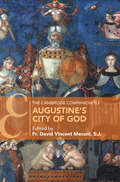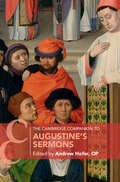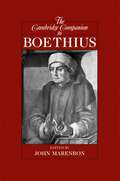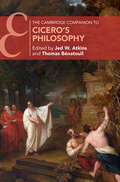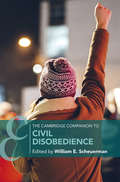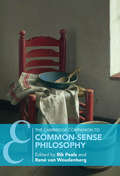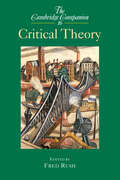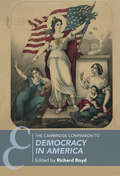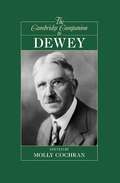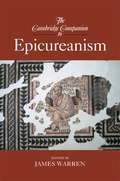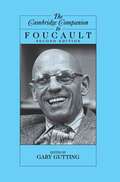- Table View
- List View
The Cambridge Companion to Aristotle's Nicomachean Ethics
by Ronald PolanskyAristotle's Nicomachean Ethics is the first and arguably most important treatise on ethics in Western philosophy. It remains to this day a compelling reflection on the best sort of human life and continues to inspire contemporary thought and debate. This Cambridge Companion includes twenty essays by leading scholars of Aristotle and ancient philosophy that cover the major issues of this foundational text. The essays in this volume shed light on Aristotle's rigorous and challenging thinking on questions such as: Can there be a practical science of ethics? What is happiness? Can we arrive at convincing accounts of virtues? Are we responsible for our character? How does moral virtue relate to good thinking? Can we act against our reasoned choice? What is friendship? Is the contemplative life the highest kind of life?
The Cambridge Companion to Aristotle's Politics
by Marguerite Deslauriers Pierre DestréeOne of the most influential works in the history of political theory, Aristotle's Politics is a treatise in practical philosophy, intended to inform legislators and to create the conditions for virtuous and self-sufficient lives for the citizens of a state. In this Companion, distinguished scholars offer new perspectives on the work and its themes. After an opening exploration of the relation between Aristotle's ethics and his politics, the central chapters follow the sequence of the eight books of the Politics, taking up questions such as the role of reason in legitimizing rule, the common good, justice, slavery, private property, citizenship, democracy and deliberation, unity, conflict, law and authority, and education. The closing chapters discuss the interaction between Aristotle's political thought and contemporary democratic theory. The volume will provide a valuable resource for those studying ancient philosophy, classics, and the history of political thought.
The Cambridge Companion to Augustine
by Eleonore Stump Norman KretzmannIt is hard to overestimate the importance of the work of Augustine of Hippo and its influence, both in his own period and in the subsequent history of Western philosophy. Many of his views, including his theory of the just war, his account of time and eternity, his attempted resolution of the problem of evil, and his approach to the relation of faith and reason, have continued to be influential up to the present. In this volume of specially-commissioned essays, sixteen scholars provide a wide-ranging and stimulating contribution to our understanding of Augustine.
The Cambridge Companion to Augustine's City of God (Cambridge Companions to Religion)
by David Vincent MeconiAugustine of Hippo's The City of God is generally considered to be one of the key works of Late Antiquity. Written in response to allegations that Christianity had brought about the decline of Rome, Augustine here explores themes in history, political science, and Christian theology, and argues for the truth of Christianity over competing religions and philosophies. This Companion volume includes specially-commissioned essays by an international team of scholars that provide new insights into The City of God. Offering commentary on each of this massive work's 22 books chapters, they sequentially and systematically explore The City of God as a whole. Collectively, these essays demonstrate the development and coherence of Augustine's argument. The volume will be an invaluable resource for students and scholars of ancient and contemporary theology, philosophy, cultural studies, and political theory.
The Cambridge Companion to Augustine's Sermons (Cambridge Companions to Religion)
by Andrew HoferAugustine of Hippo is known for some of the greatest theological masterpieces in Christian history, notably, his Confessions, The Trinity, and The City of God. Over 900 of his sermons, a treasure trove of his insights into God, Scripture, and humanity, have also survived. Given the wide dissemination of many of these texts over the past 1600 years, Augustine is arguably the most influential preacher since the time of the apostles. In recent decades, scholars have paid more attention to his sermons, including those newly discovered, with the result that Augustine's preaching has become increasingly accessible to a broad audience. The Cambridge Companion to Augustine's Sermons furthers this work by offering essays from an international team of experts. It provides a reliable guide for scholars and students of early Christian biblical exegesis, liturgy, doctrine, social practices, and homiletics, as well as for those dedicated to the retrieval of early preaching for the Church today.
The Cambridge Companion to Berkeley
by Kenneth P. WinklerGeorge Berkeley is one of the greatest and most influential modern philosophers. In defending the immaterialism for which he is most famous, he redirected modern thinking about the nature of objectivity and the mind's capacity to come to terms with it. Along the way, he made striking and influential proposals concerning the psychology of the senses, the workings of language, the aims of science, and the scope of mathematics. In this Companion volume a team of distinguished authors not only examines Berkeley's achievements but also his neglected contributions to moral and political philosophy, his writings on economics and development, and his defense of religious commitment and religious life. The volume places Berkeley's achievements in the context of the many social and intellectual traditions - philosophical, scientific, ethical, and religious - to which he fashioned a distinctive response.
The Cambridge Companion to Bertrand Russell
by Nicholas GriffinBertrand Russell ranks as one of the giants of 20th century philosophy. This Companion focuses on Russell's contributions to modern philosophy and, therefore, concentrates on the early part of his career. Through his books, journalism, correspondence and political activity he exerted a profound influence on modern thought. New readers will find this the most convenient and accessible guide to Russell available. Advanced students and specialists will find a conspectus of recent developments in the interpretation of Russell.
The Cambridge Companion to Boethius
by John MarenbonEach volume of this series of companions to major philosophers contains specially commissioned essays by an international team of scholars, together with a substantial bibliography, and will serve as a reference work for students and non-specialists. One aim of the series is to dispel the intimidation such readers often feel when faced with the work of a difficult and challenging thinker.
The Cambridge Companion to Brentano
by Dale JacquetteFranz Brentano (1838-1917) led an intellectual revolution that sought to revitalize German-language philosophy and to reverse its post-Kantian direction. This volume brings together newly commissioned chapters on his important work in theory of judgement, reform of syllogistic logic, theory of intentionality, empirical descriptive psychology and phenomenology, theory of knowledge, metaphysics and ontology, value theory, and natural theology. It also offers a critical evaluation of Brentano's significance in his historical context, and of his impact on contemporary philosophy in both the analytic and the continental traditions.
The Cambridge Companion to Carnap
by Michael Friedman Richard CreathRudolf Carnap (1891-1970) is increasingly regarded as one of the most important philosophers of the twentieth century. He was one of the leading figures of the logical empiricist movement associated with the Vienna Circle and a central figure in the analytic tradition more generally. He made major contributions to philosophy of science and philosophy of logic, and, perhaps most importantly, to our understanding of the nature of philosophy as a discipline. In this volume a team of contributors explores the major themes of his philosophy and discusses his relationship with the Vienna Circle and with philosophers such as Frege, Husserl, Russell, and Quine. New readers will find this the most convenient and accessible guide to Carnap currently available. Advanced students and specialists will find a conspectus of recent developments in the interpretation of Carnap.
The Cambridge Companion to Cicero's Philosophy (Cambridge Companions to Philosophy)
by Jed W. Atkins Thomas BénatouїlCicero is one of the most important and influential thinkers within the history of Western philosophy. For the last thirty years, his reputation as a philosopher has once again been on the rise after close to a century of very low esteem. This Companion introduces readers to 'Cicero the philosopher' and to his philosophical writings. It provides a handy port-of-call for those interested in Cicero's original contributions to a wide variety of topics such as epistemology, the emotions, determinism and responsibility, cosmopolitanism, republicanism, philosophical translation, dialogue, aging, friendship, and more. The international, interdisciplinary team of scholars represented in this volume highlights the historical significance and contemporary relevance of Cicero's writings, and suggests pathways for future scholarship on Cicero's philosophy as we move through the twenty-first century.
The Cambridge Companion to Civil Disobedience (Cambridge Companions to Philosophy)
by William E. ScheuermanThe theory and practice of civil disobedience has once again taken on import, given recent events. Considering widespread dissatisfaction with normal political mechanisms, even in well-established liberal democracies, civil disobedience remains hugely important, as a growing number of individuals and groups pursue political action. 'Digital disobedients', Black Lives Matter protestors, Extinction Rebellion climate change activists, Hong Kong activists resisting the PRC's authoritarian clampdown…all have practiced civil disobedience. In this Companion, an interdisciplinary group of scholars reconsiders civil disobedience from many perspectives. Whether or not civil disobedience works, and what is at stake when protestors describe their acts as civil disobedience, is systematically examined, as are the legacies and impact of Henry Thoreau, Mahatma Gandhi, and Martin Luther King.
The Cambridge Companion to Common-Sense Philosophy (Cambridge Companions to Philosophy)
by René Van Woudenberg Rik PeelsCommon-sense philosophy is important because it maintains that we can know many things about the world, about ourselves, about morality, and even about things of a metaphysical nature. The tenets of common-sense philosophy, while in some sense obvious and unsurprising, give rise to powerful arguments that can shed light on fundamental philosophical issues, including the perennial problem of scepticism and the emerging challenge of scientism. This Companion offers an exploration of common-sense philosophy in its many forms, tracing its development as a concept and considering the roles it has been assigned to play throughout the history of philosophy. Containing fifteen newly commissioned chapters from leading experts in the history of philosophy, epistemology, the philosophy of science, moral philosophy and metaphysics, the volume will be an essential guide for students and scholars hoping to gain a greater understanding of the value and enduring appeal of common-sense philosophy.
The Cambridge Companion to Critical Theory
by Fred RushDistinguished international contributors examine the major figures in Critical Theory, including Adorno, Benjamin, and Habermas, as well as lesser known but important thinkers. They survey the shared philosophical concerns that have given impetus to Critical Theory throughout its history, and reveal the diversity among its proponents that contributes so much to its richness as a philosophical school.
The Cambridge Companion to Deleuze
by Daniel W. Smith Henry Somers-HallGilles Deleuze (1925 1995) was an influential and provocative twentieth-century thinker who developed and presented an alternative to the image of thought found in traditional philosophy. This volume offers an extensive survey of Deleuze's philosophy by some of his most influential interpreters. The essays give lucid accounts of the fundamental themes of his metaphysical work and its ethical and political implications. They clearly situate his thinking within the philosophical tradition, with detailed studies of his engagements with phenomenology, post-Kantianism and the sciences, and also his interventions in the arts. As well as offering new research on established areas of Deleuze scholarship, several essays address key themes that have not previously been given the attention they deserve in the English-speaking world.
The Cambridge Companion to Democracy in America
by Richard BoydThis collection of essays is an invaluable companion for understanding the composition, reception, and contemporary legacy of Alexis de Tocqueville's classic work Democracy in America. Chapters by political theorists, intellectual historians, economists, political scientists, and community organizers explore the major intellectual influences on Tocqueville's thought, the book's reception in its own day and by subsequent political thinkers, and its enduring relevance for some of today's most pressing issues. Chapters tackle Tocqueville's insights into liberal democracy, civil society and civic engagement, social reform, religion and politics, free markets, constitutional interpretation, the history of slavery and race relations, gender, literature, and foreign policy. The many ways in which Tocqueville's ideas have been taken up – sometimes at cross-purposes – by subsequent thinkers and political actors around the world are also examined. This volume demonstrates the enduring global significance of one of the most perceptive accounts ever written about American democracy and the future prospects for self-government.
The Cambridge Companion to Descartes
by John CottinghamPhilosophy is one of the most intimidating and difficult of disciplines, as any of its students can attest. This book is an important entry in a distinctive new series from Routledge:The Great Philosophers. Breaking down obstacles to understanding the ideas of history's greatest thinkers, these brief, accessible, and affordable volumes offer essential introductions to the great philosophers of the Western tradition from Plato to Wittgenstein. In just 64 pages, each author, a specialist on his subject, places the philosopher and his ideas into historical perspective. Each volume explains, in simple terms, the basic concepts, enriching the narrative through the effective use of biographical detail. And instead of attempting to explain the philosopher's entire intellectual history, which can be daunting, this series takes one central theme in each philosopher's work, using it to unfold the philosopher's thoughts.
The Cambridge Companion to Descartes' Meditations
by David CunningDescartes' enormously influential Meditations seeks to prove a number of theses: that God is a necessary existent; that our minds are equipped to track truth and avoid error; that the external world exists and provides us with information to preserve our embodiment; and that minds are immaterial substances. The work is a treasure-trove of views and arguments, but there are controversies about the details of the arguments and about how we are supposed to unpack the views themselves. This Companion offers a rich collection of new perspectives on the Meditations, showing how the work is structured literally as a meditation and how it fits into Descartes' larger philosophical system. Topics include Descartes' views on philosophical method, knowledge, skepticism, God, the nature of mind, free will, and the differences between reflective and embodied life. The volume will be valuable to those studying Descartes and early modern philosophy more generally.
The Cambridge Companion to Dewey
by Molly CochranJohn Dewey (1859-1952) was a major figure of the American cultural and intellectual landscape in the first half of the twentieth century. While not the originator of American pragmatism, he was instrumental to its articulation as a philosophy and the spread of its influence beyond philosophy to other disciplines. His prolific writings encompass metaphysics, philosophy of mind, cognitive science, psychology, moral philosophy, the philosophies of religion, art, and education, and democratic political and international theory. The contributors to this Companion examine the wide range of Dewey's thought and provide a critical evaluation of his philosophy and its lasting influence, both elsewhere in philosophy and on other disciplines.
The Cambridge Companion to Duns Scotus
by Thomas WilliamsEach volume in this series of companions to major philosophers contains specially commissioned essays by an international team of scholars, together with a substantial bibliography, and will serve as a reference work for students and non-specialists. One aim of the series is to dispel the intimidation such readers often feel when faced with the work of a difficult and challenging thinker. John Duns Scotus (1265/6-1308) was (along with Aquinas and Ockham) one of the three principal figures in medieval philosophy and theology, with an influence on modern thought arguably even greater than that of Aquinas. The essays in this volume systematically survey the full range of Scotus' thought. They take care to explain the technical details of his writing in lucid terms and demonstrate the relevance of his work to contemporary philosophical debate. New readers will find this the most convenient and accessible guide to Scotus currently available.
The Cambridge Companion to Edmund Burke
by David Dwan Christopher J. InsoleEdmund Burke prided himself on being a practical statesman, not an armchair philosopher. Yet his responses to specific problems - rebellion in America, the abuse of power in India and Ireland, or revolution in France - incorporated theoretical debates within jurisprudence, economics, religion, moral philosophy, and political science. Moreover, the extraordinary rhetorical force of Burke's speeches and writings quickly secured his reputation as a gifted orator and literary stylist. This Companion provides a comprehensive assessment of Burke's thought, examining the intellectual traditions that shaped it and the concrete issues to which it was addressed. The volume explores all his major writings from his early treatise on aesthetics to his famous polemic, Reflections on the Revolution in France. It also examines the vexed question of Burke's Irishness and seeks to determine how his cultural origins may have influenced his political views - from his attitudes on religious toleration to his complicated response to Empire. Finally, it aims both to explain and to challenge interpretations of Burke as a romantic, a utilitarian, a natural law thinker, and founding father of modern conservatism.
The Cambridge Companion to Epicureanism
by James WarrenThis Companion presents both an introduction to the history of the ancient philosophical school of Epicureanism and also a critical account of the major areas of its philosophical interest. Chapters span the school's history from the early Hellenistic Garden to the Roman Empire and its later reception in the Early Modern period, introducing the reader to the Epicureans' contributions in physics, metaphysics, epistemology, psychology, ethics and politics. The international team of contributors includes scholars who have produced innovative and original research in various areas of Epicurean thought and they have produced essays which are accessible and of interest to philosophers, classicists, and anyone concerned with the diversity and preoccupations of Epicurean philosophy and the current state of academic research in this field. The volume emphasises the interrelation of the different areas of the Epicureans' philosophical interests while also drawing attention to points of interpretative difficulty and controversy.
The Cambridge Companion to Existentialism
by Steven CrowellExistentialism exerts a continuing fascination on students of philosophy and general readers. As a philosophical phenomenon, though, it is often poorly understood, as a form of radical subjectivism that turns its back on reason and argumentation and possesses all the liabilities of philosophical idealism but without any idealistic conceptual clarity. In this volume of original essays, the first to be devoted exclusively to existentialism in over forty years, a team of distinguished commentators discuss the ideas of Kierkegaard, Nietzsche, Heidegger, Sartre, Merleau-Ponty and Beauvoir and show how their focus on existence provides a compelling perspective on contemporary issues in moral psychology and philosophy of mind, language and history. A further sequence of chapters examines the influence of existential ideas beyond philosophy, in literature, religion, politics and psychiatry. The volume offers a rich and comprehensive assessment of the continuing vitality of existentialism as a philosophical movement and a cultural phenomenon.
The Cambridge Companion to Feminism in Philosophy
by Miranda Fricker Jennifer HornsbyThe thirteen specially-commissioned essays in this volume are designed to provide an accessible and stimulating guide through an area of philosophical thought and literature that has seen massive expansion in recent years. They encompass all the core subject areas commonly taught in anglophone undergraduate and graduate philosophy courses, offering both an overview of and a contribution to the relevant debates. This volume will be essential reading for any student or teacher of philosophy who is curious about the place of feminism in their subject.
The Cambridge Companion to Foucault
by Gary GuttingEach volume of this series of companions to major philosophers contains specially commissioned essays by an international team of scholars, together with a substantial bibliography, and will serve as a reference work for students and non-specialists. One aim of the series is to dispel the intimidation such readers often feel when faced with the work of a difficult and challenging thinker. Michel Foucault, one of the most important of contemporary French thinkers, exerted a profound influence on philosophy, history, and social theory. Foucault attempted to reveal the historical contingency of ideas that present themselves as necessary truths. He carried out this project in a series of original and strikingly controversial studies on the origins of modern medical and social scientific disciplines. These studies have raised fundamental philosophical questions about the nature of knowledge and its relation to power structures that have become major topics of discussion throughout the humanities and social sciences.

